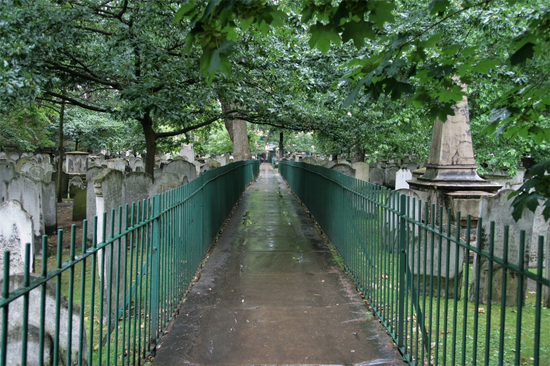In the streets around the Whitechapel Gallery, groups on Jack the Ripper walking tours huddle together in the deceptively chilly spring evening, looking down alleyways or up at windows pointed out by deep-voiced men with umbrellas. Out of the many exits to Aldgate East Station, people hurry home. Inside, as part of the East London Film Festival, a different pace is explored in the first screening of John Roger’s documentary The London Perambulator, a thoughtful and at times deeply moving piece about Nick Papadimitriou, a former arsonist who spent time in Wormwood Scrubs (where notorious serial killer Dennis Nielsen wrote a poem about him) before becoming an auto-didactic wanderer of London’s lesser known thoroughfares and postcodes. He finds fascination in Mogden water treatment works and the rough hedges, cinder paths and industrial detritus of London’s liminal zones.
Rogers’ film is an appropriately wandering tale that follows Papadimitriou as he explores these unsung areas of the capital with interjections from talking heads Will Self, Iain Sinclair and Russell Brand. Interestingly, the hardly retiring personalities of that trio never overshadow the film’s subject. In fact, they seem rather in awe of this fellow in his long brown coat, khaki rucksack, and delivery straight out of Alan Bennett. Indeed, during the post-screening Q&A, it’s abundantly clear that both Self and Sinclair feel their own work is compromised by commerce in comparison to the vast knowledge and poetics that exist entirely in Papadimitriou’s mind. For all his vocabulary and linguistic dexterity, Self comes up short next to the honest and unconscious riffing of the protagonist. One beautiful exposition on the flowing of a concreted waterway into his beloved Mogden water treatment works, Papadimitriou ends tongue-tied saying "muncipal municipality", and utters an self-directed barking laugh.
It’s his vast knowledge, and his lyrical response to it, that makes Papadimitriou one of the great unknown characters of our urban landscape. Both Self and Sinclair have expressed dissatisfaction with the vogueish term psychogeography. The former describes it as "hoary" and the latter says that he has "abdicated" himself from its usage. It seems that it’s in their encounters with the term that the pair have felt their own intellectual, poetic (in Sinclair’s case) and narrative (in Self’s) approach to urban exploration somewhat lacking. Self himself says afterwards that he thinks Papadimitriou considers his own long walks between airports rather "gauche". Instead, Papadimitriou’s exploration is described as ‘deep topography’, more akin to the work of a naturalist than the literate self-conscious urban flaneur.
Rogers says that his film began as a run-of-the-mill psychogeographical piece that soon became overtaken by its central character. It’s not hard to see why, for this is a deeply personal story. Papadimitriou sees in these unwanted landscapes a fascination that replaces the world that had no place for him — as he says, "I’ve spent my whole life walking around these kinds of places. I’ve felt like I was looking for somebody." And then, wondering what he has made in his life, he muses that in actual fact "my highest spiritual ambition is to become Middlesex", that somehow his very being will become the ashphalt beneath the tyres. This excellent film leaves one hoping that Nick Papadimitriou may make many more thoughtfully-paced steps before that final, profound perambulation occurs.



